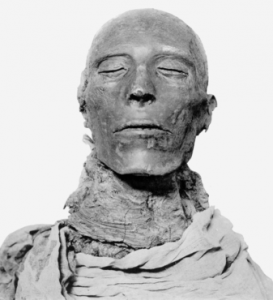I’ve been reading a biography of Sax Rohmer, the creator of Fu Manchu. The biography is quite enjoyable, if not especially reliable. (It’s based on the reminiscences of Rohmer’s widow, as well as on her reports of Rohmer’s own reminiscences; and as both Rohmers were rather fanciful storytellers and dramatisers in life as well as in literature, a heavy odor of bovine manure pervades the volume.)
In any case, I came across the following gem of critical analysis from Sax Rohmer’s pen (literally from his pen; it’s from a facsimile included in order, so we’re told [p. 273], to demonstrate how impenetrably indecipherable his handwriting was – although, as befits the book’s dubious relation to the truth, the passage is in fact perfectly readable):
Why does anybody want to know Russian? … French – yes. A knowledge of this beautiful language opens the door to a treasury of literary gems. … But Russian? Why not Eskimo or Kham? … Not only is Russian an ugly language, but what has a knowledge got to offer the student? … If we except two or three gloomy writers of no major importance, what do these new enthusiasts expect to learn from an ability to read Russian? Russia is peculiarly barren in great literature.
(Quoted between pp. 151 and 152 of Cay Van Ash and Elizabeth Sax Rohmer, Master of Villainy: A Biography of Sax Rohmer (Bowling Green University Popular Press, 1972).)
Rohmer, with his keen ability to sniff out menaces from the East, goes on to speculate that this otherwise inexplicable interest among Westerners in Russian literature and the Russian language must be part of a Communist plot aiming at a Soviet takeover of the West. Yes, he’s surely hit the nail on the head there.
Incidentally (whilst on the subject of Rohmer), the most interesting thing about the original Fu Manchu stories (by contrast, mostly, with the movies) is how easy it is to read them against the grain, i.e., to read Fu Manchu as a hero, or at least an antihero, rather than a villain. I’m not saying that was Rohmer’s intention; sadly, all evidence suggests otherwise. But if it had been his intention, he could have achieved it by writing something pretty close to the stories he actually wrote:

The mummy of Pharaoh Seti I, described by Rohmer as his conception of what Fu Manchu should look like
a) Throughout most of the stories, Fu Manchu’s “fiendish Oriental plot” consists essentially in trying to protect Asia from Western imperialism.
b) Despite his ruthlessness, Fu Manchu is portrayed, for the most part, as a man of honour, who keeps his word even to his enemies.
c) Nayland Smith, the Sherlock-Holmes-based character and supposed hero of the stories, is virulently racist; but his assistant Dr. Petrie, the Dr.-Watson-based character who narrates the early stories, while he never criticises Smith’s racism, and is not entirely free of racism himself, never expresses anything remotely close to the same level of racism as Smith, and also comes across generally as far more likable than Smith – all of which serves to distance the stories from a full endorsement of Smith’s “Yellow Peril” rhetoric. And while Smith describes Fu Manchu as “the yellow peril incarnate in one man,” Rohmer has other sympathetic and knowledgeable characters describe the idea of a “Yellow Peril” as “ridiculous” and a “defunct bogey,” insisting that whatever threat Fu Manchu and others like him may pose has nothing to do with their being specifically Chinese. Relatedly, when Petrie falls in love with Kâramanèh (an “eastern” or “Eurasian” woman of rather vague ethnicity), Smith immediately distrusts her on racist grounds – but she turns out to be reliable and trustworthy; here again, the racist perspective of the supposed hero is undermined.
In many ways Fu Manchu seems to be a fictional ancestor of pulp heroes like the Shadow (who was similarly a mysterious, powerful, and fiendishly clever figure, principled but ruthless, with a vast army of agents). William Blake once described John Milton, in connection with his romantic portrayal of Satan’s rebellion in Paradise Lost, as being “of the Devil’s party without knowing it,” and I think it might equally be said that Rohmer was of Fu Manchu’s party without knowing it.
I’d love to see a miniseries featuring Fu Manchu as the protagonist. As noted, it could follow the plots of the original stories with surprisingly few changes. I’d also love to see it fill in the backstory that is only alluded to in the original stories (Fu Manchu seems to have been involved in the Opium Wars and Tong Wars – but also to have picked up doctorates at the Universities of Edinburgh, Heidelberg, and Paris).
No comments yet.